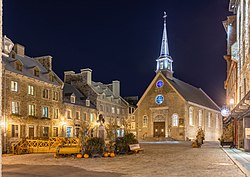
Back Quebecstad Afrikaans Québec (Stadt) ALS ኬበክ ከተማ Amharic Cwebecburg ANG كيبك (مدينة) Arabic كيبك (مدينه) ARZ Québec (ciudá) AST Opictikweak ATJ Kvebek (şəhər) Azerbaijani کبک شهری AZB
Québec | |
|---|---|
| Ville de Québec (French) | |
|
| |
| Nicknames: | |
| Motto(s): Don de Dieu feray valoir ("I shall put God's gift to good use"; the Don de Dieu was Champlain's ship) | |
| Coordinates: 46°48′50″N 71°12′29″W / 46.81389°N 71.20806°W[2][3] | |
| Country | Canada |
| Province | Quebec |
| Region | Capitale-Nationale |
| Metropolitan community | Communauté métropolitaine de Québec |
| Agglomeration | Agglomeration of Quebec City |
| Historic countries | Kingdom of France Kingdom of Great Britain |
| First settled | 11 October 1535, by Jacques Cartier |
| Founded | 3 July 1608, by Samuel de Champlain |
| Constituted | 1 January 2002 |
| Incorporated | 1832[4] |
| Boroughs | |
| Government | |
| • Type | Quebec City Council |
| • Mayor | Bruno Marchand |
| • MPs | List of MPs |
| • MNAs | List |
| Area | |
• City | 452.30 km2 (174.63 sq mi) |
| • Land | 453.38 km2 (175.05 sq mi) |
| • Urban | 442.85 km2 (170.99 sq mi) |
| • Metro | 3,499.46 km2 (1,351.15 sq mi) |
| Elevation | 98 m (322 ft) |
| Population (2021)[6] | |
• City | 549,459 (12th) |
| • Density | 1,214.8/km2 (3,146/sq mi) |
| • Urban | 733,156 (8th) |
| • Urban density | 1,655.5/km2 (4,288/sq mi) |
| • Metro | 839,311 (7th) |
| • Metro density | 239.8/km2 (621/sq mi) |
| • Pop 2016–2021 | |
| Demonym | Québécois or Québécois de Québec (to distinguish residents of the city from those of the province) |
| Time zone | UTC−05:00 (EST) |
| • Summer (DST) | UTC−04:00 (EDT) |
| Postal codes | |
| Area codes |
|
| GDP (Québec CMA) | CA$47.94 billion (2020)[10] |
| GDP per capita (Québec CMA) | CA$53,477 (2016) |
| Website | www |
| Official name | Historic District of Old Quebec |
| Type | Cultural |
| Criteria | iv, vi |
| Designated | 1985 (9th session) |
| Reference no. | 300 |
| Region | Europe and North America |
Quebec City[a] is the capital city of the Canadian province of Quebec. As of July 2021, the city had a population of 549,459,[13] and the Census Metropolitan Area (including surrounding communities)[14] had a population of 839,311.[15] It is the twelfth-largest city and the seventh-largest metropolitan area in Canada. It is also the second-largest city in the province, after Montreal. It has a humid continental climate with warm summers coupled with cold and snowy winters.
Explorer Samuel de Champlain founded a French settlement here in 1608, and adopted the Algonquin name. Quebec City is one of the oldest European settlements in North America. The ramparts surrounding Old Quebec (Vieux-Québec) are the only fortified city walls remaining in the Americas north of Mexico. This area was declared a World Heritage Site by UNESCO in 1985 as the "Historic District of Old Québec".[16][17]
- ^ Marceau, Stéphane G.; Rémillard, François (2002). Ville de Québec (in French) (4th ed.). Montreal: Guides de voyage Ulysse. p. 14. ISBN 2-89464-510-4.
- ^ "Quebec City". Geographical Names Data Base. Natural Resources Canada.
- ^ Cite error: The named reference
toponymiewas invoked but never defined (see the help page). - ^ "Incorporation de Québec". 23 October 2007. Archived from the original on 28 October 2021. Retrieved 11 March 2018.
- ^ a b Cite error: The named reference
mamrotwas invoked but never defined (see the help page). - ^ a b "Population and Dwelling Count Highlight Tables, 2016 Census". Government of Canada, Statistics Canada. 8 February 2017. Archived from the original on 28 October 2021. Retrieved 15 February 2017.
- ^ a b "Population and Dwelling Count Highlight Tables, 2021 Census". Government of Canada, Statistics Canada. 9 February 2022.
- ^ Cite error: The named reference
cp2011-CAwas invoked but never defined (see the help page). - ^ Vallières, Marc. "Québec City". Archived from the original on 22 May 2012. Retrieved 17 June 2012.
- ^ "Gross domestic product (GDP) at basic prices, by census metropolitan area (CMA)". 6 December 2023.
- ^ "Quebec". Oxford English Dictionary (Online ed.). Oxford University Press. (Subscription or participating institution membership required.)
- ^ Government of Canada, Natural Resources Canada. "Place names – Québec". www4.rncan.gc.ca. Archived from the original on 28 October 2021. Retrieved 31 March 2019.
- ^ "Québec, Ville [Census subdivision], Quebec and Québec, Territoire équivalent [Census division], Quebec". Census 2021. Statistics Canada. Archived from the original on 6 February 2025. Retrieved 6 February 2025.
- ^ "Census Profile". Statistics Canada. Retrieved 10 February 2025.
- ^ "Population and Dwelling Count Highlight Tables, 2021 Census". www12.statcan.gc.ca. Government of Canada, Statistics Canada. 15 November 2023. Archived from the original on 23 September 2018. Retrieved 15 February 2017.
- ^ "Historic District of Old Québec Archived 28 June 2011 at the Wayback Machine". World Heritage; UNESCO. Retrieved 12 January 2009.
- ^ "Old Quebec City, Seven Wonders of Canada". cbc.ca. Archived from the original on 7 February 2008. Retrieved 12 February 2008.
Cite error: There are <ref group=lower-alpha> tags or {{efn}} templates on this page, but the references will not show without a {{reflist|group=lower-alpha}} template or {{notelist}} template (see the help page).











